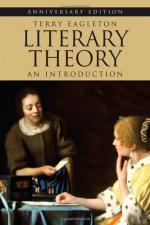
|
| Name: _________________________ | Period: ___________________ |
This quiz consists of 5 multiple choice and 5 short answer questions through Introduction: What is Literature?.
Multiple Choice Questions
1. How many decades, according to Eagleton, has there been a "striking proliferation of literary theory" since the publication of the Russian formalist's pioneering essay?
(a) One.
(b) Two.
(c) Five.
(d) Six.
2. According to Eagleton, "In the late sixteenth and early seventeenth centuries, the word ______seems to have been used about true and fictional events."
(a) Theory.
(b) News.
(c) Memoir.
(d) Novel.
3. According to Eagleton, "theory was a way of _______ literary works from the ________of civilised sensibility'"
(a) Studying; truth.
(b) Excluding; oppression.
(c) Dismissing; idea.
(d) Emancipating; stranglehold.
4. According to the Russian critic Roman Jakobson, literature represents "organized ______committed on ordinary _______."
(a) Violence; speech.
(b) Violence; people.
(c) Protest; speech.
(d) Religion; writing.
5. How far has the "theoretical revolution" spread according to Eagleton?
(a) Within the inner circle of critics and readers.
(b) Far beyond the circle of specialists and enthusiasts.
(c) Not beyond the circle of specialists and enthusiasts.
(d) To the outer circle of critics and readers.
Short Answer Questions
1. For the economist Eagleton discusses, "those economists who dislike theory or claimed to get along better without it" were what?
2. Eagleton provides the analogy of finding a "scrap of writing from a long-vanished civilization" to make what point about deciphering its meaning?
3. According to Eagleton, the Russian formalist shifted their attention to the "material reality" of what?
4. According to Eagleton, why did the Russian formalists NOT see a literary work as a vehicle for ideas, reflection of reality, or transcendental truth?
5. According to Eagleton, formalism is the application of what to the study of literature?
|
This section contains 386 words (approx. 2 pages at 300 words per page) |

|




